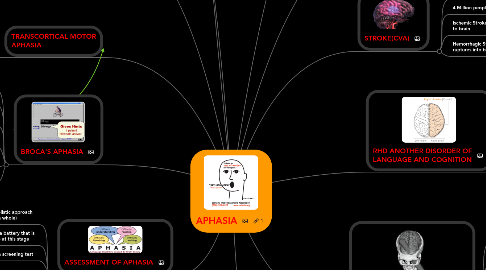APHASIA
Hannah Dempseyにより


1. GLOBAL APHASIA
1.1. Large, or multiple areas of brain are injured
1.2. Effects different or many sensory modalities
1.3. Likely to be non-fluent with poor language comprehension
1.4. Often nonverbal with very few gestures
2. TRANSCORTICAL MOTOR APHASIA
2.1. Very similar to symptoms of broca's aphasia
2.2. Strong repetition and strong oral reading
3. BROCA'S APHASIA
3.1. Frontal lobe damage
3.2. Non-fluent, expressive, motor aphasia
3.3. Slowed, halting, speech; typically only 4 or 5 words in an utterance
3.4. Repetition is mildly to severely impaired
3.5. Macrographia (oversized writing) and misspellings are common
3.6. Has trouble with expression
4. ASSESSMENT OF APHASIA
4.1. Professionals use the holistic approach (viewing everything as a whole)
4.1.1. Normally different professionals word together in the treatment setting
4.2. ALPS: relatively brief aphasia battery that is often appropriate for clients at this stage
4.2.1. Examination is immediately done after neurological injury
4.3. BEST: Bedside evaluation screening test
4.4. Prognostic Indicators: variables that assist in predicting recovery
4.4.1. Functional Outcomes: Improvement in communication is essential in the Speech pathologists practice
5. WERNICKE'S APHASIA
5.1. Temporal,sometimes parietal lobe damage
5.2. Fluent, receptive, and sensory aphasia
5.3. Spontaneous speech and utterences
5.4. Logorrhea (excessive talking)
5.4.1. Neologisms (no words)
5.4.2. Jargon (nonsensical sentences)
5.4.3. Circumlocation
5.5. Difficulty with interpreting written and verbal messages, and repetition
5.6. Has trouble with comprehension
6. TRANSCORTICAL SENSORY APHASIA
6.1. Damage at border of temporal lobe and occipital lobe
6.2. Similar to Wernicke's aphasia
6.3. Have good repetition skills
6.3.1. Echolalia: repeat auditory stimuli
7. STROKE(CVA)
7.1. Most common cause of Aphasia
7.1.1. Can also cause RHD and Dementia
7.2. 4 Million people in U.S are stroke survivors
7.3. Ischemic Stroke: blockage of blood supply to brain
7.4. Hemorrhagic Stroke: excessive blood ruptures into brain
8. CONDUCTION APHASIA
8.1. Temporal-parietal damage at the arcuate fasciculus (pathway connecting communication with speech production and reception)
8.2. Fluent with conduction, mild to moderate expressive deficits
8.3. Unable to use repetition but understands
9. ANOMIC APHASIA
9.1. Most common aphasia
9.2. Severe naming and writing deficits
10. RHD ANOTHER DISORDER OF LANGUAGE AND COGNITION
10.1. Right-hemisphere dysfunction(RHD)
10.2. Loss of nutrients and oxygen to the brain causes damage to brain tissue
10.2.1. Caused by stroke, illness, or disease
10.3. Lack of attention to left side of body
10.4. Difficulty recognizing faces
10.5. Wordy expression, including tangents
10.6. Problems with higher-level abstract thinking and language use
10.7. Lack of awareness of communicative and cognitive impairments
11. TBI ANOTHER DISORDER OF LANGUAGE AND COGNITION
11.1. Traumatic brain injury (TBI)
11.2. Neurological damage to brain tissue due to closed- or open-head injury
11.2.1. Caused by motor vehicle accident, fall, recreational sports accident, act of violence
11.3. Possible significan personality changes
11.4. Widespread language expression and comprehension problems
12. DEMENTIA ANOTHER DISORDER OF LANGUAGE AND COGNITION
12.1. Gradual onset of declines in cognitive, language, and daily living functions due to progressive central nervous system dysfunction
12.2. Cause is Neurological disease and multiple strokes
12.2.1. Huntington's disease, Parkinson's disease, Pick's disease, Creutzfeldt-Jakob disease
